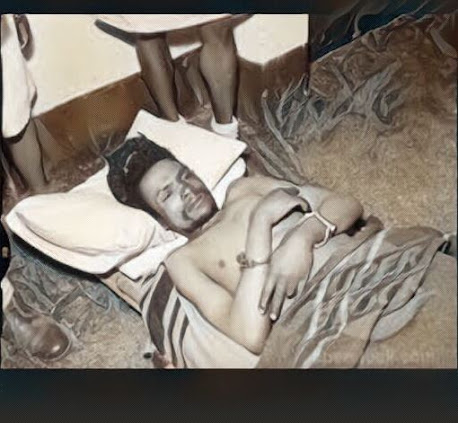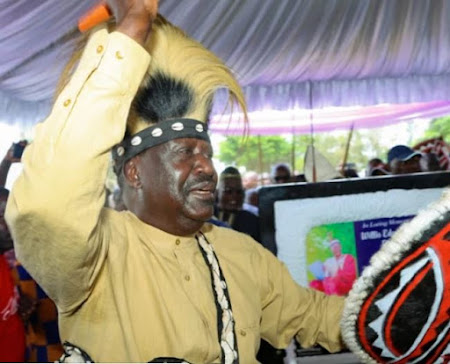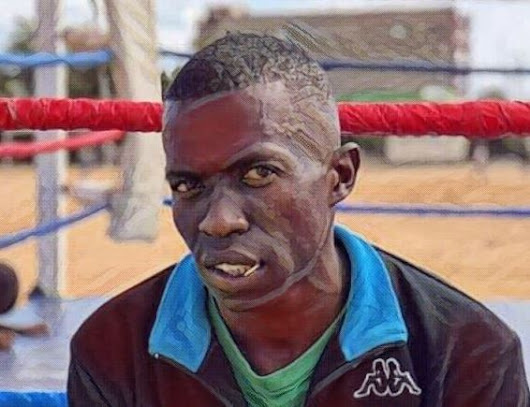Dedan Kimathi's last heart-breaking letter written in pencil the night before he was hanged at Kamiti Maximum Security Prison
Dedan Waciuri Kimathi's farewell letter
Dedan Kimathi died young at the tender age of 37. He died a defeated man in great pain from gun shot wounds and the torture he went through in the hands of his captors. He had no way of knowing what impact his gallant resistance effort had really had. How would he have imagined in his wildest fantasies that independence (albeit with more frustrations from a new master) was just 6 short years away?
The letter below written in surprisingly good English for a man with such scanty education paints the picture of a lonely man who fears that he will be forever forgotten but prepared fully for the after-world. It brought tears to my eyes.
The letter dated was written on 17th February 1957, one day before Kimathi was executed by the British Colonial Government in Kenya on 18th February 1957. The letter is addressed to one Father Marino of Catholic Mission, P.O. Box 25, Nyeri, Kenya.
Multi Millionaire Caught Working As Street Cleaner 6 days a week
---
The source of the letter is the Kenya National Archives, where a typed copy of the same was on display at the Kenya National Archives Public Gallery in the 1990s, since when it has been brought down. However members of the public can on request, get a typed photocopy of Kimathi’s said below letter at the Kenya National Archives. It remains unclear if the original handwritten copy of Kimathi’s said below letter still exists, and if it still does, in whose possession it is. Contents of Kimathi’s said letter of 17th February 1957 reproduced below verbatim…--------------------------------
Dedan Kimathi
C/O H.M Prison (i.e. Her Majesty’s Prison)
17th February 1957
Father Marino
Catholic Mission
P.O. Box 25
Nyeri
Dear Father,
It is about one O’clock night that I have picked up my pencil and paper so that I may remember you and your beloved friends and friends before the time is over.
I am so busy and so happy preparing for heaven tomorrow the 18th February 1957. Only to let you know that Father Whellam came in to see me here in my prison room as soon as he received the information regarding my arrival. He is still a dear kind person as I did not firstly expect. He visits me very often and gives me sufficient encouragement possible. He provided me with important books with more that all have set a burning light throughout my way to paradise, such as :-
1. Students Catholic Doctrine
2. In the likeness of Christ
3. The New Testament
4. How to understand the Mass
5. The appearance of the Virgin at Grotto of Lourdes
6. Prayer book in Kikuyu
7. The Virgin Mary of Fatima
8. The cross of the Rosary etc.
I want to make it ever memorial to you and all that only Father Whellam that came to see me on Christmas day while I had many coming on the other weeks and days. Sorry that they did not remember me during the birth of our Lord and Savior. Pity also that they forgot me during such a merry day.
I have already discussed the matter with him and I am sure that he will inform you all.
Only a question of getting my son to school. He is far from many of your schools, but I trust that something must be done to see that he starts earlier under your care etc.
Do not fail from seeing my mother who is very old and to comfort her even though that she is so much sorrowful.
My wife is here. She is detained at Kamiti Prison and I suggest that she will be released some time. I would like her to be comforted by sisters e.g. Sister Modester, etc. for she too feels lonely. And if by any possibility she can be near the mission as near Mathari so that she may be so close to the sisters and to the church.
I conclude by telling you only to do me favor by getting education to my son.
Farewell to the world and all its belongings, I say and best wishes I say to my friends with whom we shall not meet in this busy world.
Please pass my complements and best wishes to all who read Wathiomo Mukinyu. Remember me too to the Fathers, Brothers and Sisters.
With good hope and best wishes,
I remain dear Father
Yours Loving, and Departing Convert
D. Kimathi
However in the 50s (the decade that tribalism was probably at its' lowest ebb ever in Kenya. Because Luos were getting elected to parliament in Nairobi by an enthusiastic Kikuyu electorate and Luo men were falling head over heels in love with Kikuyu women.)

Because if we were to believe this widely held view, then Wambui would never have become Mrs Wambui Otieno (she has recently remarried a much younger fellow called Mbugua in a marriage recorded by the media at the AG's chambers in 2003 that hit the headlines across the continent). All young Kikuyu ladies from Wambui's days were circumcised. And virtually all DhoLuo men from Mr Otieno's days were NOT circumcised. But the sparks still flew between these two Kenyans. And Mrs Wambui Otieno is just the sort of tough cookie that would have told off any jeering fellow Kikuyu with the words like; "it is non of your business and if you try anything I will show you that at least one of us is cut."
By the time the Otieno's marriage ended in the late 80s with the tragic death of Mr Otieno who by then had distinguished himself as probably one of the finest Kenyan criminals lawyers to ever walk the corridors of the high court, the couple had been married for over 3 decades. But sadly the end was far from being a happy one. Mr Otieno's Umira Kager clan from Nyalgunga, Luo Nyanza insisted on burying Otieno in his ancestral home following all traditions to the letter, including the dreaded Tero Buru. Tough former freedom fighter Wambui Otieno, said "over my dead body." She pointed out quite clearly that her sweetheart had indicated to her that he wanted to be buried at their Upper Matasia home (near Ngong). What followed was the mother of all legal tussles. Sad that Mr Otino must have helped write many wills in his time but never wrote one for himself which would have averted all the heartbreak and suffering for his wife, Wambui.
In my opinion, this court battle further divided Luos and Kikuyus and must have been used as a stern warning to many young people hit by cupids arrow (flying from the wrong direction so to speak) for many years.
I can still imagine those stern parents saying to those poor love-struck youngsters; "Do you want us to go to court when one of you dies?"
Wambui won the sympathy of many Kenyans across tribal lines but lost the court battle and her right to bury her own husband.
I dare add that I believe that many Luos took the opportunity presented by this case “to get back at the Kikuyu.” In other words, those who have always promoted this hatred (on both sides) are constantly spoiling for a fight and looking for every opportunity to further their evil cause.
Wambui and Mbugua at their wedding reception.

To many Kenyans, Wambui Otieno embodies the dilemma Africans face between the old African ways and the modern Western lifestyle that is rapidly becoming the dominant culture across Africa. Wambui caused a public scandal this week by marrying a stonemason 42 years her junior in a short civil ceremony in the Attorney General’s office. ‘Love is what matters. Love is blind,’ she said, ‘women should be liberated so that they can marry men younger than them.’
Wambui is a descendant of the great Chief Waiyaki, patriarch of an important Kikuyu clan, whose descendants included Kenya’s first president Jomo Kenyatta as well as cabinet minsters, high court judges and leading industrialists. Wambui was one of the only women to join the Mau Mau rebellion against the British in the 1950’s and later became a Nairobi politician and vocal activist for women’s rights.
By the time she married her first husband, SM Otieno, Wambui already had three children by two fathers. Both families opposed Wambui’s wedding to SM because marrying outside one’s tribe was highly unusual at that time. For a Kikuyu to marry SM, a member of the Luo tribe, was like ‘mixing oil and water’ as her uncle later testified. SM’s clan opposed the marriage because marrying a Kikuyu woman with three children born out of wedlock was nothing short of a scandal.
The Kikuyu despise the Luo as kihii, uncircumcised fish-eaters, while the Luo see the Kikuyu as arrogant and greedy westernised Africans who have abandoned their cultural traditions. Wambui did not care that her family did not see her uncircumcised husband as a ‘real’ man and she refused the traditional dowry between families saying ‘ I am not going to be married under any bride price because you know women then become property of the clan. I am worth more than a few goats.’ The couple took advantage of a 1931 statute, the African Christian Marriage Act ‘making it clear they were not bound by tribal customs’ as Wambui’s lawyer later described it in court. They had married for love.
By the time SM passed away from hypertension in 1986, the couple had fifteen children. According to Luo tradition, when a man dies, his relatives inherit his possessions. Since the Luo consider a wife and children as possessions, a deceased man’s brother inherits his wife. But the immediate problem was not the fact that Wambui was now deemed the potential wife of SM’s brother but the more pressing problem of where to bury SM’s body. This issue became one of the most hotly contested debates in Kenya’s legal and social history and brought about a clash of opinion between African traditionalists and modernists that has risen to the surface again seventeen years later with Wambui’s new marriage to Steven Mbugua, who was seven years old when SM died.
SM did not leave a will because he knew as a lawyer that wills have been overturned in Kenyan courts in favour of clans claiming a relative’s body. He relied instead on the evidence of 15 of his children, his wife, friends, neighbours, lawyers, journalists and leading members of society who he instructed specifically that he wished to be buried at his farm in Upper Matasia near Nairobi. He expressly forbade his wife and children to allow his other relatives to bury him in his ancestral village Nyalgunga in Siaya district some 300 kilometres away from his house, saying that to do so would be ‘to throw me away’.
Upon his death, Wambui ordered a grave to be dug on the farm only to discover that SM’s relatives had taken out a court injunction barring her from doing so. Wambui and the Umira Kager clan went to court and within three weeks, the court decided that SM was ‘a metropolitan and a cosmopolitan….it is hard to envisage such a person as subject to African customary law and in particular the customs of a rural community,’ overturning the injunction. The clan appealed immediately.
The Court of Appeal over-ruled the lower court’s verdict, arguing that despite SM’s education, marriage, professional success and verbal instructions, it was wrong to assume that ‘the deceased had thereby lost his tribal identity and could not be governed by customary laws, traditions and culture.’ A full trial was ordered.
According to testimony in court, recently deceased Luo are a bridge between the living and the ancestors. The ‘living dead’ therefore have a direct influence on day-to-day matters. Great importance is attached to burial rites. A cast of characters gave evidence on behalf of the clan including witchdoctors and the gravedigger who had buried SM’s father, who testified from his hospital bed. SM’s brother told the court that unless he was allowed to bury his brother in the prescribed way, SM’s ghost would ‘sabotage his life’ and ‘make his clansmen spit on him.’ The Professor of Philosophy from Nairobi University testified that an improper burial meant that ‘your children or your livestock may die and if you sire children they may be born without legs.’
Wambui’s lawyers presented evidence from many well-known members of society who confirmed SM’s wish to be buried at his farm and his distaste for traditional custom. The judges conceded that there was no doubt that SM had expressed a desire to be buried on the outskirts of the city hundreds of miles from his ancestral home. What was at stake was not his wishes but the importance of the old ways against the new, whether customary laws of the village and tribe could take precedence over the laws of the Kenyan nation and constitution and most importantly, which of them should govern the social institutions of marriage, birth and death.
Thousands of Luo men surrounded the high court each day and newspapers reported the trial verbatim. Newspapers with headlines like ‘Luos have no homes in Nairobi’ and ‘We’ll be haunted if we don’t bury him’ sold out by mid-morning. The case was the talk of Africa.
On February 13th 1987, six months after SM’s death, the court decided that SM was to be buried by the clan in his ancestral village against his own wishes and those of his wife and children. The Appeal Court Judge said that Wambui ‘chose to be married to a man who was not of her tribe. She knew she was marrying a Luo. She cannot now complain that the Luo are uncivilized…they did not force her to be married into their clan…times will come when circumstances dictate that Luo customs with regard to burial be abandoned. Change is inevitable but must be gradual.’
The clan mobbed the city mortuary where SM’s body remained under police guard and carried the corpse on the back of a truck to SM’s ancestral home in Siaya district for the funeral which was attended by three cabinet ministers and thousands of Luo tribespeople. African tradition had won on the day, a decision praised throughout Kenya at the time. Wambui and her family including SM’s children chose to boycott the funeral deliberately breaking the taboo that dictates that Luo children should visit their father’s grave to lay a cross as a final part of the burial ceremony.
Wambui’s new marriage has reignited the debate about the degree to which African traditions and customs are important in modern life. SM’s clan have objected to Wambui’s ‘sham and repugnant marriage’ saying, ‘Wambui is still married to SM Otieno’ and reiterated calls for her to go to Siaya to be inherited by SM’s relatives. ‘Even if Wambui died today, the Umira Kager clan will ensure she is buried at Nyalgunga, next to SM Otieno's grave.’
Cabinet Ministers have described Wambui's marriage as ‘a golden opportunity’ for Kenyans of all walks of life to consider the meaning of the institution of marriage as the country moves towards a new constitution. ‘I don't think there would be so much fuss if an old man married a much younger lady, ’ said Wangari Maathai, head of the Culture Committee at the conference on Kenya’s new constitution.
Home Affairs minister Moody Awori said: ‘Love has no boundaries’ but added quickly that the two consenting adults must be of opposite sexes. The opposition secretary for Labour, Ms Orie Rogo-Manduli differed, describing the wedding as ‘an isolated case of Kenyans in mid-winter madness. Women must continue to play their role as role models and be cradle rockers and not cradle robbers.’
Wambui’s story brings together many elements of the African dilemma; the old traditions versus modern living, a British legal system dealing with an African cultural case, tribalism versus an individual’s rights in a democracy, traditional beliefs versus modern science, women’s rights in a chauvinist society and the role of a wife, the family, the clan and the tribe in modern African society. It also raises fundamental and sensitive questions about identity and what it really means to be African.
Kenyans of all persuasions debate the Wambui case in an effort to find meaning and significance in a society where the ancient and the modern have difficulty in coexisting. Urbanisation, westernisation and modernisation have not bought prosperity and harmony but sowed the seeds of discord.
Eminent African scholar Colin Turnbull commented on this ‘disconnect’ for Africans by saying ‘there is a void in the life of the African…. to go forward is to abandon the past where the roots of his being have their nourishment; to go backward is to cut himself off from the future, for there is no doubt about where the future lies…there is no bridge and this is the source of his terrible loneliness’.
In a final twist, Wambui’s new mother in law Florence Nyambura announced after Wambui’s wedding that her son had another fiancée called Mugure, who he was scheduled to marry next month as a second wife. This development came as a surprise to the Wambui the modern politician and women’s rights activist. Then events took a rapid turn for the worse when her new husband’s family announced that Wambui’s mother in law had taken ill and died quite mysteriously.
Kenyans remain divided into modern and traditional camps on who is to blame for the tragic death. Some blame the press for harassing her and others blame the Umira Kager clan who they believe cursed Mbugua for marrying Wambui, ‘their wife’. Either way, Wambui remains a heroine for women in Kenya and a flag-bearer for modernist Africans in the 21st century.
I dug this out of the Kumekucha archives
Similar stories;
Size Matters In A Husband And Is Ending Way Too Many Marriages
I Regret Mini Skirt I Was Wearing During Imara Daima Carjacking Ordeal
Macabre Cases Of Intercourse With The Dead And Dead Men behaving Badly After Death
Woman has epileptic fit every time she tries to be with a man
SICK!!! Gangsters hijack Matatu & Force Male Passengers on Female Passengers As They Watch
Campus Girl Makes Kshs 20,000 Monthly Selling Pregnancy Test Kits To Students
You Dream You Are Pregnant: Why It Is So VERY Dangerous
Most Beautiful Woman On Earth Is Charcoal Black But Mother Kills Toddler With Skin Lightners
self made millionaire business ideas
Very revealing make money secrets from real life situations that unfolded. This Brian Tracy and Kumekucha Chris nuggets of information are nothing short of game-changing.
Ruto had a plan and a burning desire to be president. That much is clear. He launched a crusade (in his mind) to achieve his ultimate goal, long before he actually vied. Read article
Read revealing Ruto article on this blog -----A celebrated boxing champion is among Kenyans who lost their lives during the anti-government protests on Wednesday 12th July 2023.
---
The corporate empire of billionaire David Langat was driven into uncharted terrain this week when auctioneers forced the sale of his Mombasa office buildings and Nandi tea estate in order to pay a local bank more than Sh2.1 billion in back debt.
Read; Has David Langat fallen out with close buddy William Ruto?
---
Former Kakamega Governor Wycliffe Oparanya, according to Azimio La Umoja One Kenya Coalition Party Leader Raila Odinga, has been arrested by police. He was later released.
Just yesterday: Oparanya recounts how rowdy youths damaged his car during demonstrations in Busia---
Most leading analysts including Pro. Herman Manyora seem to agree that the government of William Ruto is on the losing end of the Maandamano duel with Azimio and Raila Odinga. It is as clear as day.
This is Uhuru's future from a man who has NEVER gotten it wrong (2013 prediction)
...Then in the midst of all these uncertainties an arrogant Briton came into the country for prayers and started making predictions and prophecies on the country's political future. Few Kenyans had ever heard of the London based preacher. But he spoke with such authority that some Kenyans even got annoyed.
Then he predicted Uhuru Kenyatta's future and I did not like it one bit.... This is Uhuru's future from a man who has NEVER gotten it wrong (2013 prediction)




















Comments